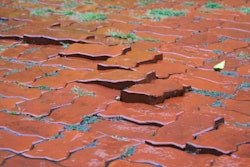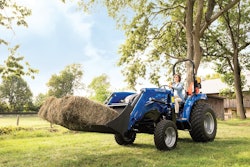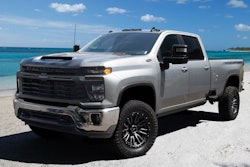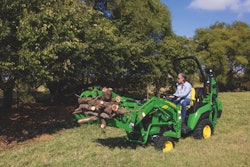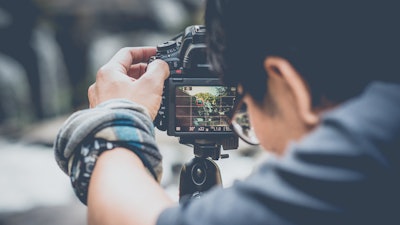
Many times, a disagreement breaks out between the landscaping company and the photographer when it concerns contracts, distribution rights and the like.
Take a look at what you need to keep in mind when partnering with a professional photographer to take pictures of your work sites.
Intellectual property
Photos and images are considered intellectual property, which means that ownership begins and almost always remains with the photographer.
Even if your landscaping company hires a photographer for a photo shoot, the employment is typically a contractor relationship, which means the photos are still owned by the photographer. Said photographer can grant you unlimited access to these photos but legal ownership will remain with the photographer.
However, if a member of your landscaping staff takes the photo, uses your equipment and does so on paid company time, you, the employer, will be considered the rightful owner of the photo.
Photo license
Photographers never really sell you a photo; they merely grant you permission (license) to use said photo. When you are licensing a photo, keep in mind that you do not own it.
Along with this, remember that you don’t have the right to give these photos to a third party for use. This happens more often than not and can cause a huge misunderstanding.
For example, if you contract out a photographer to come take shots of a completed project, you might receive a very open license to use their photos. If a magazine or online publication then contacts you to ask if they can use the photos in a story they are writing about you, the answer is no. While these photos could be used in a print advertisement in said magazine, the magazine would become the user of the photo when using it for editorial purposes. Therefore, they should be the ones to reach out to and negotiate their own license with the photographer.
Along those same lines, other collaborators with you on projects, such as builders working with landscape architects, may ask for copies of these photos for their personal portfolios. This, also, is a no, as the photo license applies to you and you alone.
Photo use
When you purchase a license, you are paying the photographer to use the photo in a specific way, as how you plan to use the photo can often affect the price. The photo’s permissions will detail specifically how the photos can and can’t be used.
Some of these permissions will be very restrictive and will pertain to one particular medium, a particular time frame or will be based on a number of views. Some permissions will be specific to editorial use only and not advertisements, and some can be more general, which gives you free reign to use the photos online, etc.
Stock photos and personal photos
When in doubt, stock photos can be a good alternative to avoiding these legal issues. The market for stock photography is well-known, fairly inexpensive and can be an efficient method to make sure you have a wide variety of images to choose from.
Keep in mind when buying stock images from a stock agency, you will only be granted non-exclusive rights for that photo. This means that legally this photo can be used on other sites, billboards, etc. Some of these agencies will offer to sell you semi-exclusive or exclusive rights, but you will most certainly have to pay for this exclusivity.
If you do choose to use a stock agency, make sure it’s a reputable company, as there are some out there that sell rights to images they don’t own.
Along those same lines, be leery of using “free” images off the internet, as these images could have already been shared multiple times, and they are the intellectual property of someone else that doesn’t know the photo’s being circulated.
If you decide that you would prefer not to have to deal with purchasing stock photos or the possibility of having stolen photos featured on your site, you can always opt to train someone in your landscaping company to take photos instead. This will ensure that all photos used are 100 percent owned by you, while still offering you the ability to showcase your own unique projects.
Contracts and copyright notices
As you would with any other contract for services, keep your receipt when it comes to working with photographers and stock agencies. These contracts will prove how much the owner or agency is being compensated and which permissions are being granted.
More than likely, the contracts will be restricted by medium, resolution or instance count, or it could require you to list photo credits or backlinks to the owner/photographer.
In case your licensure usage is ever challenged by the owner of an image, it’s in your best interest to have a detailed record of your photography license purchases.
If your landscaping company has a copyright notice at the bottom of your website, this is your way of letting the world know that you have the rights to display everything that’s on the site.
Copyright notices like this also tell the world “all rights reserved,” which lets them know that you, the owner, will defend your ownership over the content. If you do find yourself if the position of licensing content from another owner, it’s always a good idea to add a line to the content stating you do, indeed, have the permission of that owner to use the material.
Negative mail
No matter what precautions you take to ensure you’re on the up-and-up with legal photo use, there will come a day when you receive some sort of negative or menacing-looking email/letter from someone claiming you stole their image.
Larger stock agencies have both legal and technical staff dedicated to finding illegal uses of their photos, and they also have software that’s able to find unauthorized uses of their photos.
If you find yourself facing a demand for payment or a “cease and desist” letter from the owner, don’t panic. First of all, take emails and letters like this with a grain of salt. Deeply consider whether the claim in legitimate or just someone wanting to get money out of your company.
By keeping copies of your contracts, you can easily settle reputable disputes by showing proof that you, indeed, followed the rules of your agreement. If you do, however, find that you’ve used a photo without the proper licenses, talk to your company attorney to determine if the “copyright owner” is legitimate.
Depending on the severity of the situation, your attorney could reduce the amount of the demanded payment, or you could save money by just choosing to pay the fine outright. Keep in mind, though, that the fine isn’t a license. Once that fine is paid, make sure you either stop using the image or seek appropriate licenses to continue using it.



